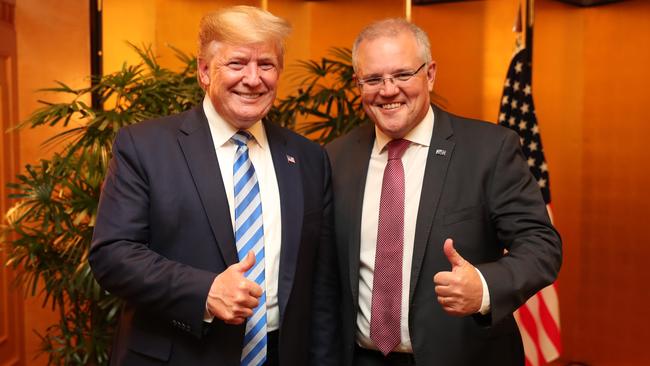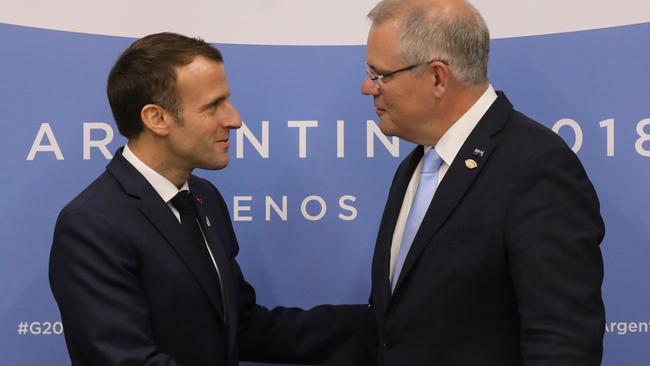Morrison pushes Macron for help with Beijing
Australia and the US urge France to boost its Pacific influence to counterbalance China’s ambitions.

Australia and the US are urging France to boost its Pacific influence as part of a new strategic and economic alliance that would act as a counterbalance to China’s ambitions and mark a significant shift in attitude towards the French presence in the region.
The Australian has confirmed that agreement was reached for a closer alignment of Australian and French interests, including investment in the Indo-Pacific, when Scott Morrison met French President Emmanuel Macron last month in Britain.
The Prime Minister arrived last night in Osaka, Japan, to join world leaders for the G20 summit, where trade and strategic tensions between the US and China will be at the top of the agenda.
While no further formal meetings between the Prime Minister and Mr Macron have been planned, Mr Morrison revealed that three weeks ago in Portsmouth the leaders discussed further French engagement in our region and co-operation on development assistance.
In a speech last year in Sydney, Mr Macron said he was looking to Australia and France to form an “axis” in the Indo-Pacific to promote stability, but was quick to say it wasn’t a reaction to China.
A senior official in the Morrison government said that since then the US and Australia had been urging France to strengthen its presence as one of the only European countries still to have territory in the South Pacific.
The source said the move to consolidate France as a “Pacific power” would be seen as a significant change in attitude to France’s colonial role in the region, which was marked by outrage and controversy as recently as 1995 when it resumed nuclear testing in French Polynesia.

The source said that — with Australia already deepening defence ties with France through the future submarine contract — the next step was to partner as economic and strategic allies in a region that faces increasing instability.
“President Macron is one of an ever-growing list of leaders who have taken a keen interest in our Pacific Step Up program because, like Australia, France wants to be closely engaged with the next chapter for the region,” Mr Morrison told The Australian.
“When we met in Portsmouth we agreed to work more closely together to better align our investments and development support in the region. With like-minded countries like France backing genuine and long-term connections and support for our Pacific partners, we can complement each other’s work.”
France controls islands in the Pacific — including New Caledonia and French Polynesia — where more than one million people live, and sends navy ships into the South China Sea at least twice a year.
Mr Morrison said that, as the world kept changing and partnerships shifted, there were “deep human connections our countries share with the Pacific as well as strategic and economic ties”.
“It’s a long-term vision of engagement that I see for Australia that I know a number of other world leaders share,” the Prime Minister said. “Last year, when I announced Australia’s Pacific Step Up, I talked about a new level of respect, familiarity and appreciation and I know there’s huge scope for co-operation between the Pacific and countries like France and Australia, where shared interests sit alongside shared values.”
Australian Strategic Policy Institute executive director Peter Jennings said the comments from Mr Morrison were “very significant”.
He said a deeper strategic partnership in the Pacific with France would be noticed by Beijing.
“I hope it will be seen as an example of like-minded democracies co-operating together to resist Chinese encroachment in the South Pacific,” Mr Jennings said. “If (Beijing) think they can cower other countries into passivity, then they will do it. Being prepared to stand up for things we value with the French, that is an approach that China … would respect.”
Mr Macron, who visited Australia in May last year, signed joint agreements on closer defence and cyber ties with then prime minister Malcolm Turnbull.
He also called for Australia, France and India to strengthen ties for stability in the region. “Our joint responsibility is to build this strong Indo-Pacific axis, both to protect our economic interests as well as our security interests,” Mr Macron said. “This region is crucial for the stability of the world.”
France is an established and permanent player in the region. It has been getting significantly closer to Australia on defence and intelligence co-operation.
“It is very welcome that we’ve got a consequential like-minded democracy active in the region alongside Australia,’’ Mr Jennings said. “Frankly, the more the better. It’s a great initiative and it starts to put substance around what the French will be eager to claim was a strategic relationship they were creating when the submarine design contract was announced.”
France’s post-war presence in the region has been marked by controversy. It was subject to international protests in the 1970s and again in 1995, when it resumed nuclear testing in French Polynesia. In 1985, it shocked the world when French secret service divers sank Greenpeace vessel the Rainbow Warrior in Auckland to prevent it protesting against nuclear testing. A photographer trapped on the boat drowned.
In a speech this week, Mr Morrison emphasised again the importance of the Pacific region as China sought to engage island nations through investment and development funding.
“We have returned the Pacific to where it should be — front and centre of Australia’s strategic outlook, our foreign policy and our personal connections,” he said. “We will continue to lead by example, developing our close web of relationships across and within the Indo-Pacific.”
The 2017 foreign policy white paper put engagement with the Pacific as one of the highest priorities.
On becoming prime minister last year, Mr Morrison said he would be “taking our engagement to a new level” in the region.




To join the conversation, please log in. Don't have an account? Register
Join the conversation, you are commenting as Logout